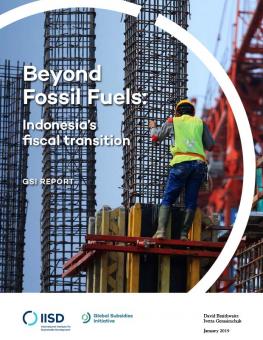
Beyond Fossil Fuels: Indonesia's fiscal transition
This report explores how Indonesia taxes and subsidizes the production and consumption of oil, gas, coal and electricity now; and what lies ahead.
Key Messages
- Government revenues from fossil fuel production are in rapid decline. Transition away from tax and non-tax revenues from oil, gas and coal extraction in Indonesia requires a transparent and comprehensive discussion.
- The use of government revenues from upstream oil & gas is trapped by subsidies to fuel & electricity consumption. These subsidies are an inefficient mechanism for redistribution of the declining export rents from fossil fuels.
- Revenues from the taxation of fossil fuel production and consumption as well as savings from subsidy reforms should be invested in productive uses supporting social development and economic diversification. Investments in renewable energy can be one of the sectors driving diversification of the Indonesian economy and its fiscal transition away from fossil fuels.
Indonesia is one of the few developing countries that can boast of reducing fiscal dependence on revenues from fossil fuel production while growing and diversifying both the economy and government revenue base. Since the beginning of the 21st century, Indonesia experienced a drop in government revenues from upstream oil and gas—from 35 per cent of the total revenues (7 per cent of GDP) in 2001 to just 6 per cent (less than 1 per cent of GDP) in 2016. Meanwhile, Indonesia’s rates of GDP growth (at 3–4 per cent per year) and budget deficit (at 2–3 per cent) remained largely unchanged.
However, the country faces several challenges in moving further towards a fiscal system supporting clean energy and a sustainable economy. Compared with other BRIICS countries, Indonesia underutilizes the fiscal space it can create by taxing energy consumption. Fuel consumption taxes (VAT and motor fuel tax) generate just a third of the value of fuel and electricity subsidies (0.57 per cent of GDP vs. 1.7 per cent of GDP on annual average over 2014–2016). These subsidies are an inefficient mechanism for redistribution of the declining export rents from fossil fuels. A lot of barriers remain in the way of renewable energy development.
This publication makes a first attempt at an integrated analysis of how Indonesia both taxes and subsidizes production and consumption of oil, gas, coal and electricity (most of which is generated with coal). The paper also explores lessons learned from Indonesia’s reduction of fiscal dependence on fossil fuels. Chapter 1 reviews the state of play in the oil, gas and coal sectors and in particular the role of state-owned enterprises. Chapter 2 focuses on the dynamics of government revenue from fossil fuels vs. its expenditure on fuel and electricity subsidies. Chapter 3 looks at the Indonesian policies linked to economic diversification.
The paper is a sister publication of the forthcoming IISD analysis Beyond Fossil Fuels: Fiscal Transitions in BRIICS and follows the same methodology.
Participating experts
Additional downloads
You might also be interested in
Reforming Environmentally Harmful Subsidies
This playbook offers a strategic framework for philanthropic organizations to understand, engage, and advance environmentally harmful subsidies reform as a critical avenue for sustainable environmental and economic transformation.
Federal Legislative Authority in Relation to Oil and Gas Development in Canada
This report outlines federal legislative authority related to oil and gas development in Canada.
Fossil Fuel Subsidy Reform in Aviation and Shipping
Countries can address fossil fuel subsidies in aviation and shipping by changing legislation to allow for reform and introducing emission levies.
Five Key Priorities to End Fossil Fuel Subsidies in Canada
As the G7 president in 2025, Canada has a pivotal opportunity to lead by fully phasing out fossil fuel supports and investing in a cleaner, more equitable future. Here are five recommendations for effective subsidy reform.